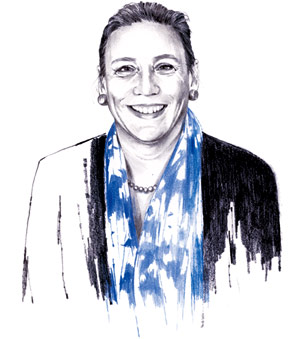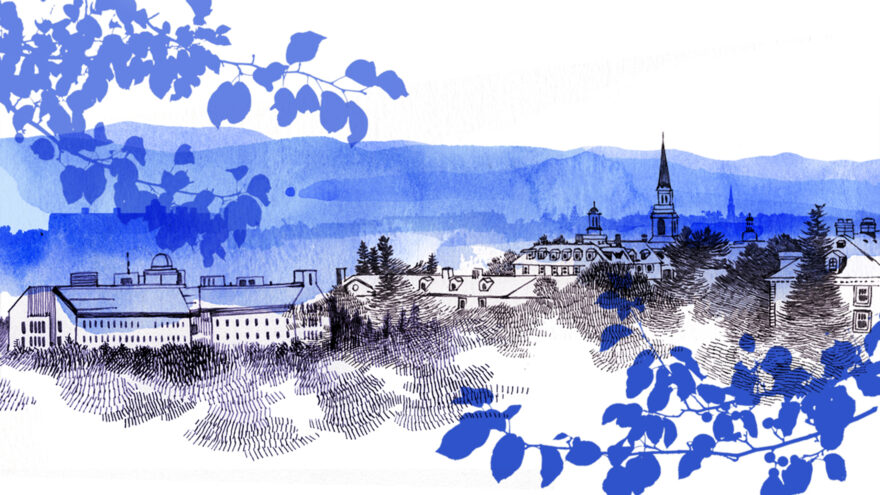
Last summer, many of us at Middlebury were transfixed by the story of a group of young boys halfway around the world. These were the Wild Boars, 12 members of a Thai boys’ soccer team and their young coach, who were trapped in a flooded cave in Thailand’s Chiang Rai Province who were trapped in a flooded cave in Thailand’s Chiang Rai Province for more than two weeks until a team of international divers found them and brought them safely back aboveground in a dramatic rescue operation.
There were many heroic moments in that story. One that stood out for me was that of Adul Samon, a 13-year-old student from Wa, an unrecognized state within Myanmar. Using the basic English that he had learned, Adul politely greeted the divers who discovered the team and was then able to communicate with the rescuers on behalf of the other boys and their coach.
His actions stayed with me long after the story receded off the top of the news feed. How did this young stateless boy from a rural school possess the courage to step into this unexpected leadership role? He seemed much like a quintessential Midd Kid to me: poised, thoughtful, doing the right thing at the right moment, and having a real impact.
In May, we had the privilege of talking to Adul Samon and the director of his school, Phunawhit Thepsurin, about the importance of language study and the Ban Wiang Phan School’s emphasis on learning multiple languages. The two were our guests at Commencement, where Adul was awarded our inaugural Global Citizen’s Award. This award is a newly created annual honor that recognizes people who, through their communication skills and compassion, enact meaningful change in the world.
Adul studies three languages and is able to communicate in five: his native Wa, then Burmese, Thai, English, and Mandarin. Thepsurin emphasizes language in his school’s curriculum because he believes—appropriately so—that for his students, understanding multiple languages is critical for social, economic, practical, and communal reasons. The school sits near the border of three countries—the “Golden Triangle” of Myanmar, Thailand, and Laos—with Vietnam and China close by. Thepsurin wants to take advantage of that location to create a new kind of language learner, even at the high school level.
We have a very different perspective on language learning in the U.S. With English as the world’s lingua franca, our educational system, in general, doesn’t emphasize the importance of acquiring a second language, let alone a third, fourth, or fifth. When I see the transformation each summer with our Language Schools students, who are completely immersed in their language of study during their time here, I see what we gain when we live in a language other than our native tongue. For one thing, hidden parts of ourselves are often revealed. I’ll talk with our students about what they discover about themselves—how they find out they’re funnier, perhaps, in another language, or more thoughtful, or more outspoken. In the case of Adul Samon, he discovered that, in English, he had the capacity to help save his friends and be the bridge between the rescuers and those waiting in the dark to be rescued.
When we established our Global Citizen’s Award, we underscored that facility in global languages and cultures is an essential part of today’s Middlebury. Our strategic framework states our intention to be an internationally networked changemaker, and we’re well positioned to achieve that because of our unique expertise and capacity in the global preparation of students. As we move into the future, we plan to leverage our leadership to increase opportunities for our students to learn from and contribute to communities and programs around the world—much like how, in its own way, the Ban Wiang Phan School is doing.
We also believe that a global education should rest on the principle of the equal exchange of knowledge. To that end, we will be engaging in a long-term, sustainable exchange with Ban Wiang Phan School, its students, and its director. For the next three years, we are funding a summer internship program at the school. After a period of training, Middlebury students will teach English to the students. We hope to utilize the resources of our TESOL (Teaching English to Speakers of Other Languages) program at the Middlebury Institute of International Studies at Monterey to build a lasting partnership between us—a transformational, rather than transactional, connection that will provide everyone involved with the opportunity to connect the dots between language learning and the larger societies in which we live.
As for Adul, he told me he’s still playing soccer (when he does, he speaks Thai and sometimes Chinese); he’s still studying English; and he still speaks Wa with this family, and Thai and Chinese with his friends. You can hear one of our conversations yourself: it will be an episode of my new podcast series, Midd Moments, which will debut this fall. The podcast will focus on independent thinkers who create community—and Adul and his colleagues are certainly great examples of that distinctly Middlebury strength.
I look forward to sharing my conversation with Adul and other conversations about how Middlebury and its people build community. We have great stories to tell—and many languages to tell them in.

Leave a Reply